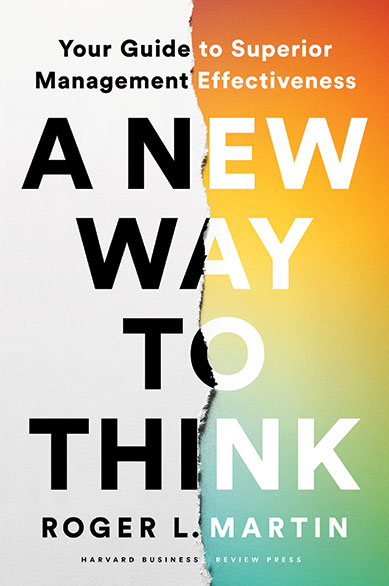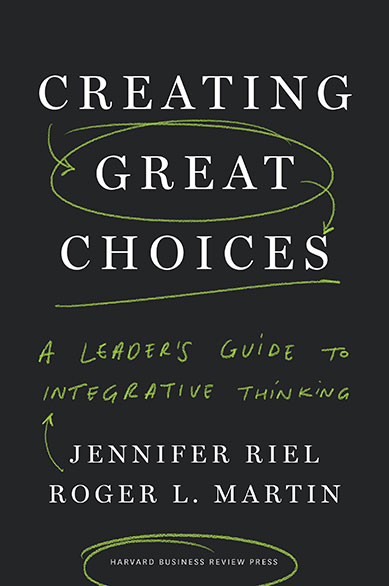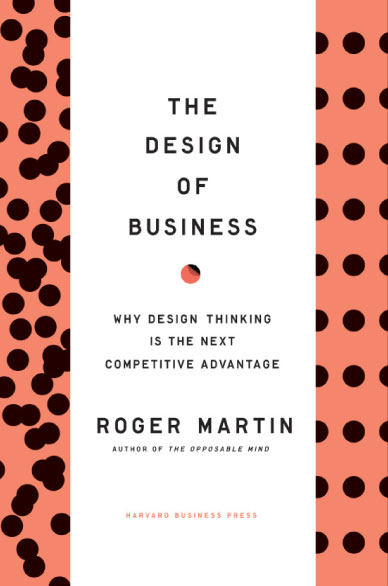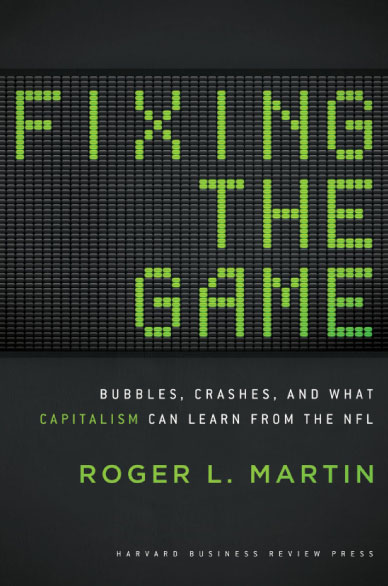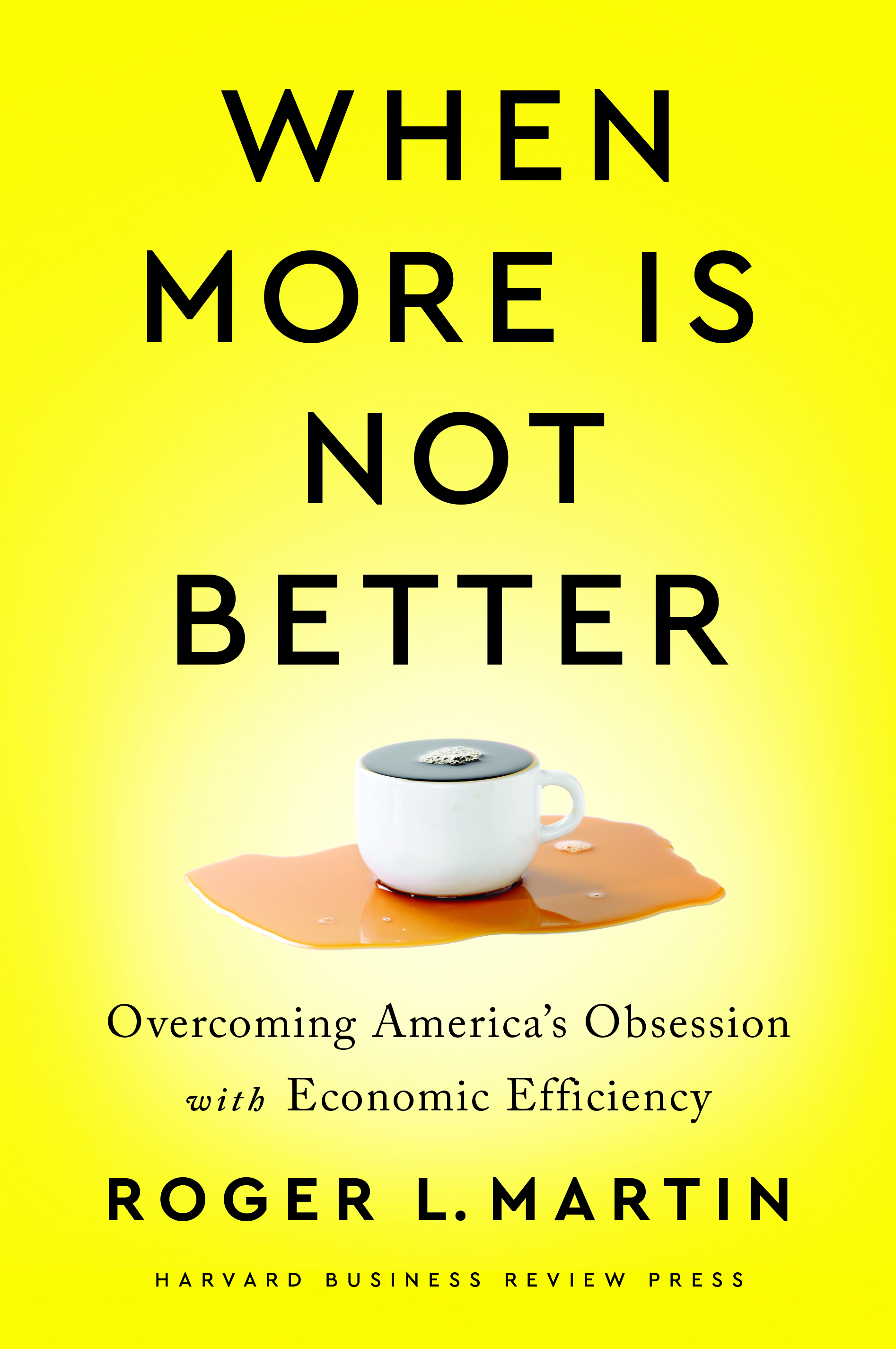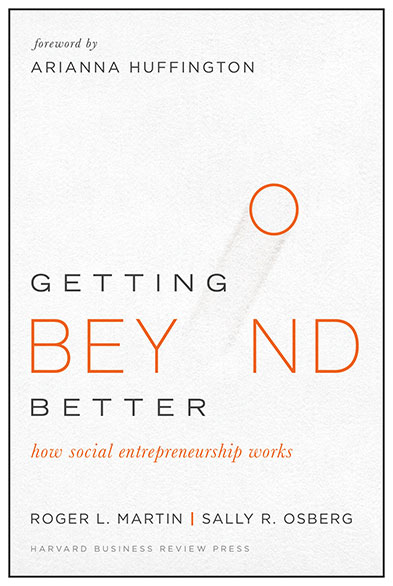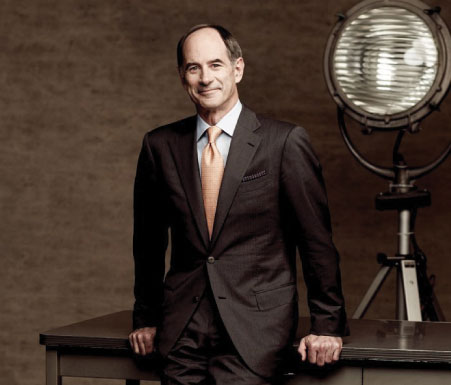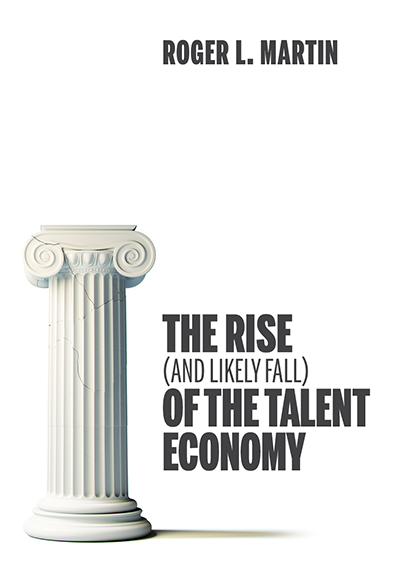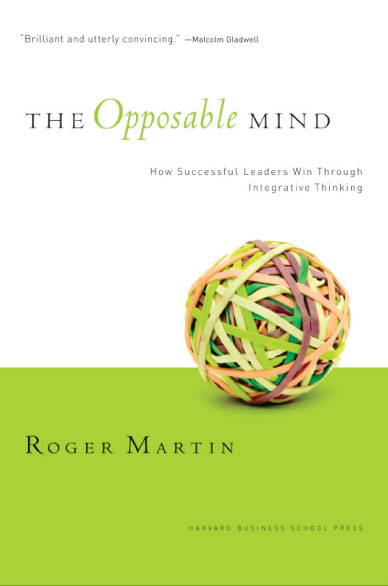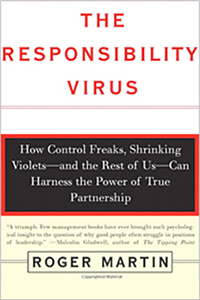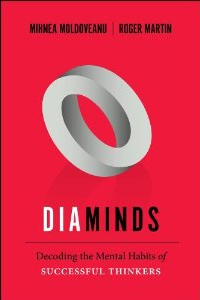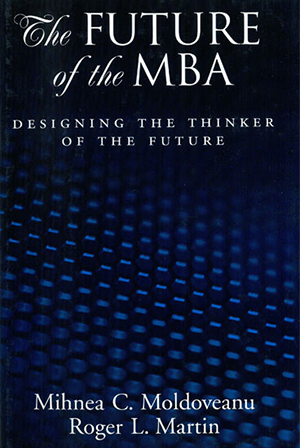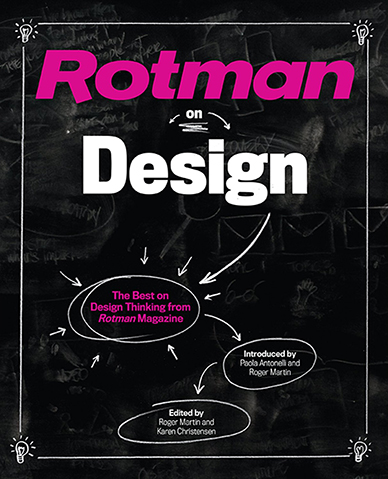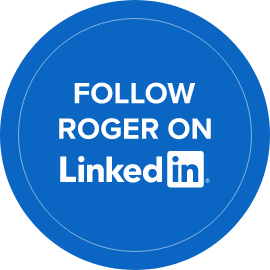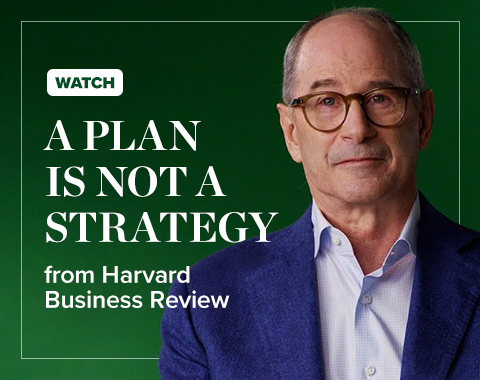-
Harvard Business Review
Leaders Shouldn’t Try to Do It All
A.G. Lafley and Roger L. Martin
January-February, 2025
-
Harvard Business Review
The Right Way to Build Your Brand
With Jann Schwarz and Mimi Turner
January-February 2024
-
Harvard Business Review
Designing Jobs Right
January-February 2023
-
Harvard Business Review
Strategy in a Hyperpolitical World
w/ Martin Reeves
November-December 2022
-
Harvard Business Review
The Real Secret to Retaining Talent
March-April 2022
-
Harvard Business Review
It’s Time to Replace the Public Corporation
Jan-Feb 2021
-
Harvard Business Review
What Managers Get Wrong About Capital
May-June 2020
-
Harvard Business Review
The One Thing You Need to Know About Managing Functions
with Jennifer Riel
July-August 2019
-
Harvard Business Review
The High Price of Efficiency
January-February 2019
-
Harvard Business Review
Management Is Much More Than a Science
with Tony Golsby-Smith
September-October 2017
-
Harvard Business Review
Customer Loyalty is Overrated
with A.G. Lafley
January-February 2017
-
Harvard Business Review
M&A: The One Thing You Need to Get Right
Roger Martin
June 2016
-
Harvard Business Review
The Overvaluation Trap
with Allison Kemper
December, 2015
-
Harvard Business Review
Design for Action
with Tim Brown
September 2015
-
Harvard Business Review
Two Keys to Sustainable Social Enterprise
Roger L. Martin and Sally R. Osberg
May 2015
-
Harvard Business Review
The Rise (and Likely Fall) of the Talent Economy
October 2014
-
Harvard Business Review
The Public Corporation Is Finally in Eclipse
Roger Martin
April 2014
-
Harvard Business Review
The Big Lie of Strategic Planning
Roger Martin
January–February 2014
-
Harvard Business Review
Rethinking the Decision Factory
Roger L. Martin
October 2013
-
Harvard Business Review
Target the Right Market
Roger Martin, Jill Avery, Thomas Steenburgh and MikeVolpe
October 2012
-
Harvard Business Review
Bringing Science to the Art of Strategy
with A.G. Lafley, Jan W. Rivkin, and Nicolaj Siggelkow
September 2012
-
Harvard Business Review
Saving the Planet: A Tale of Two Strategies
with Alison Kemper
April 2012
-
Harvard Business Review
The Innovation Catalysts
June 2011
-
Harvard Business Review
Don’t Get Blinded by the Numbers
March 2011
-
Harvard Business Review
The Execution Trap
July-August 2010
-
Harvard Business Review
The Age of Customer Capitalism
January/February 2010
-
Harvard Business Review
Two Leading Researchers Discuss the Value of Oddball Data
November, 2009
-
Harvard Business Review
How Successful Leaders think
June 2007
-
Harvard Business Review
Forethought: Directing For All The Wrong Reasons
June 2006
-
Harvard Business Review
Breakthrough Ideas for 2005: Validity vs. Reliability
February 2005
-
Harvard Business Review
Capital vs. Talent: The Battle That's Reshaping Business
with M. Moldoveanu
July 2003
-
Harvard Business Review
Taking Stock: If You Want Managers to Act in Their Shareholders' Best Interests, Take Away Their Company Stock
January 2003
-
Harvard Business Review
The Virtue Matrix: Calculating the Return on Corporate Responsibility
March, 2002
-
Harvard Business Review
Changing the Mind of the Corporation
November 1993
-
HBR.org
Leaders Need to Harness Aristotle’s 3 Types of Knowledge
with Richard Straub and Julia Kirby
October 2, 2020
-
HBR.org
Pricing Needs to Reflect Who People Want to Be, Not Just What They Want
January 25, 2019
-
HBR.org
Remembering Jack Bogle and Herb Kelleher, Two Great Strategists
January 18, 2019
-
HBR.org
The Board's Role in Strategy
December 28, 2018
-
HBR.org
Should Mark Zuckerberg Resign?
January 8, 2019
-
HBR.org
Activist Hedge Funds Aren't Good for Companies or Investors, So Why Do They Exist?
August 20, 2018
-
HBR.org
Why the U.S. Trade Deficit Can Be a Sign of a Healthy Economy
July 27, 2018
-
HBR.org
GE's Fall Has Been Accelerated by Two Problems. Most Other Big Companies Face Them, Too.
June 29, 2018
-
HBR.org
It's Time to Make More Jobs Good Jobs
December 4, 2017
-
HBR.org
CEOs Should Stop Thinking that Execution is Somebody Else's Job; It Is Theirs
November 21, 2017
-
HBR.org
In the Workplace of the NFL, the Players Hold the Upper Hand
October 31, 2017
-
HBR.org
The UK’s Snap Election Reminds Us That Proposing a Change Forces People to Ask New Questions About You
June 13, 2017
-
HBR.org
What If Investors Who Held Their Shares Longer Got More Voting Power?
April 27, 2017
-
HBR.org
Strategic Choices Need to Be Made Simultaneously, Not Sequentially
Roger Martin
April 3, 2017
-
HBR.org
A Little Competition Could Improve Your HR, IT, and Legal Departments
Roger Martin
February 21, 2017
-
HBR.org
How the Attacks on Trump Reinforce His Strategy
January 12, 2017
-
HBR.org
Use Design Thinking to Build Commitment to a New Idea
January 3, 2017
-
HBR.org
Are Americans Enamored with the Wrong Kinds of Entrepreneurs?
November 11, 2016
-
HBR.org
The False Premise of the Shareholder Value Debate
September 26, 2016
-
HBR.org
Strategy and Execution Are the Same Thing
Roger L Martin
January 12, 2016
-
HBR.org
How Social Entrepreneurs Make Change Happen
with Sally Osberg
October 14, 2015
-
HBR.org
Strong Dollar, Weak Thinking
October 13, 2015
-
HBR.org
Yes, Short-Termism Really Is a Problem
October 9, 2015
-
HBR.org
Why Talking About Strategy “Execution” Is Still Dangerous
September 15, 2015
-
HBR.org
What Economists Get Wrong About Measuring Productivity
September 14, 2015
-
HRB.org
How Talent Pulls One Over on the Capitalists
August 4, 2015
-
HBR.org
The First Question to Ask of Any Strategy
Roger Martin
May 5, 2015
-
HBR.org
Strategy Is About Both Resources and Positioning
Roger Martin
April 27, 2015
-
HBR.org
There Are Still Only Two Ways to Compete
Roger Martin
April 21, 2015
-
HBR.org
Stop Distinguishing Between Execution and Strategy
Roger Martin
March 13, 2015
-
HBR.org
Two Words That Kill Innovation
December 9, 2014
-
HBR.org
Capitalism Needs Design Thinking
with Tim Brown and Shoshana Berger
December 8, 2014
-
HBR.org
The Dark Side of Efficient Markets
October 15, 2014
-
HBR.org
Why Monopolistic Pension Funds Undermine Capitalism
October 6, 2014
-
HBR.org
When Talent Started Driving Economic Growth
September 30, 2014
-
HBR.org
We Can’t Talk About Inequality Without Talking About Talent
September 23, 2014
-
HBR.org
A Brief History of America’s Attitude Toward Taxes
September 16, 2014
-
HBR.org
When Star Talent Grew More Powerful than Capital
September 9, 2014
-
HBR.org
The Fall of the Talent Economy?
September 4, 2014
-
HBR.org
In America, Labor Is Friendless
August 28, 2014
-
HBR.org
Does Cheap Online Video Trump Text?
Roger Martin
July 4, 2014
-
HBR.org
Strategy Isn’t What You Say, It’s What You Do
Roger Martin
June 18, 2014
-
HBR.org
Why Smart People Struggle with Strategy
Roger Martin
June 12, 2014
-
HBR.org
Strategy Is Iterative Prototyping
Roger Martin
June 6, 2014
-
HBR.org
How to Win the Argument with Milton Friedman
June 2, 2014
-
HBR.org
Strategize First, Analyze Later
Roger Martin
May 29, 2014
-
HBR.org
Adaptive Strategy Is a Cop-Out
Roger Martin
May 23, 2014
-
HBR.org
Three Quick Ways to Improve Your Strategy-Making
Roger Martin
May 22, 2014
-
HBR.org
Help Leaders Be Less Useless at Strategy
Roger Martin
May 16, 2014
-
HBR.org
A Simple Nuance that Produces Great Strategy Discussions
Roger Martin
May 8, 2014
-
HBR.org
Which Strategy “Comfort Traps” Are You Falling Into?
Roger Martin
May 3, 2014
-
HBR.org
Are You Confusing Strategy with Planning?
Roger Martin
May 2, 2014
-
HBR.org
The Unexpected Benefits of Rapid Prototyping
Roger Martin
February 11, 2014
-
HBR.org
Strategy in a World of Constant Change
Roger Martin
February 3, 2014
-
HBR.org
The Five Rules Every New CEO Should Follow
Roger Martin
October 14, 2013
-
HBR.org
The Cure for Self-Inflicted Complexity
Roger Martin
October 4, 2013
-
HBR.org
Our Self-Inflicted Complexity
Roger Martin
September 6, 2013
-
HBR.org
Should Barnes & Noble Turn into a Mini-Mall?
Roger Martin
July 15, 2013
-
HBR.org
The Best Companies Combine Marketing and Strategy
March 14, 2013
-
HBR.org
J.C. Penney Desperately Needs a Strategy
March 11, 2013
-
HBR.org
Strategy Is All About Practice
February 20, 2013
-
HBR.org
Don't Let Strategy Become Planning
February 5, 2013
-
HBR.org
Trending Again: Emoting at the World Economic Forum
January 28, 2013
-
HBR.org
Placing Strategic Bets in the Face of Uncertainty
January 22, 2013
-
HBR.org
Strategy and the Uncertainty Excuse
January 8, 2013
-
HBR.org
Why I Decided to Rethink Hiring Smart People
October 17, 2012
-
HBR.org
Before You Take a Risk, Lay Out the Logic
June 19, 2012
-
HBR.org
Do Financial Regulators Have Principles? Wanted: Financial Regulators with Backbone
March 22, 2012
-
HBR.org
The U.S. Needs to Make More Jobs More Creative
February 27, 2012
-
HBR.org
How to Make Companies Think Long-Term
October 3, 2011
-
HBR.org
CEOs Must Model the Behavior for Creating Societal Value
September 26, 2011
-
HBR.org
You Can't Analyze Your Way to Growth
September 12, 2011
-
HBR.org
Can Apple Survive Without Steve Jobs?
August 29, 2011
-
HBR.org
Are You Ready for Some Football?
July 25, 2011
-
HBR.org
Cool Alone Won’t Save Your Company
July 20, 2011
-
HBR.org
The Nasty Truth about CEO Pay
June 3, 2011
-
HBR.org
CEOs Should Be More Like Quarterbacks
May 3, 2011
-
HBR.org
Finding the Hidden Gems in Your Business Model
February 22, 2011
-
HBR.org
How to Successfully Manage Opposing Strategies
January 27, 2011
-
HBR.org
The Integrative Strategic Move of “Doubling Down”
January 17, 2011
-
HBR.org
A Smart Example of an Integrative Strategy
December 10, 2010
-
HBR.org
When Strategy Fails the Logic Test
November 24, 2010
-
HBR.org
How I Knew AOL Time Warner Was Doomed (No, Really!)
November 2, 2010
-
HBR.org
Board Chairs Should Be More Like Judges
October 14, 2010
-
HBR.org
Six Ways to Tell if You Have a Bad Board
September 29, 2010
-
HBR.org
Why Good Boards Aren’t There When You Need Them
September 20, 2010
-
HBR.org
Management Is Not a Profession — But It Can Be Taught
July 1, 2010
-
HBR.org
Moving from Strategic Planning to Story Telling
June 1, 2010
-
HBR.org
Five Questions to Build a Strategy
May 26, 2010
-
HBR.org
It’s Time to Tax the Wall Street Casino
May 11, 2010
-
HBR.org
My Eureka Moment with Strategy
May 3, 2010
-
HBR.org
Regulators' Challenge: Correct the Error or the Cover-up?
April 19, 2010
-
HBR.org
The Secret to Meaningful Customer Relationships
March 24, 2010
-
HBR.org
Saving Stock-Based Compensation From Itself
March 22, 2010
-
HBR.org
Why CEO’s Don’t Owe Shareholders a Return on Market Value
March 11, 2010
-
HBR.org
Five Ways to Heal American Capitalism
March 3, 2010
-
HBR.org
Why Modern Business Is Bad for Your Mental Health
February 23, 2010
-
HBR.org
The Inauthentic Communities of the Modern Executive
February 17, 2010
-
HBR.org
What We All Lost When Business Lost Respect
February 9, 2010
-
HBR.org
Barack Obama’s Integrative Brain
January 29, 2010
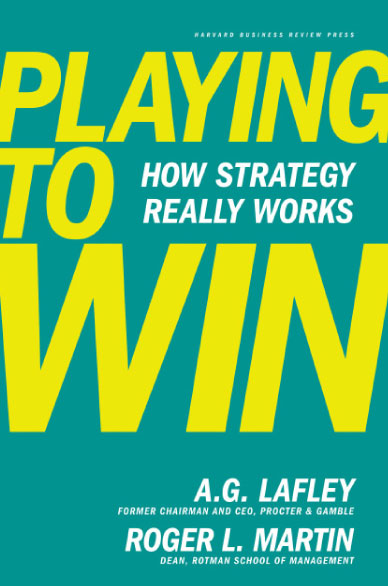 Buy the book
Book roger to speak
Buy the book
Book roger to speak
